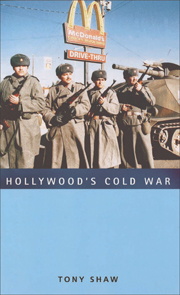Book contents
- Frontmatter
- Contents
- Acknowledgements
- List of Abbreviations
- Introduction
- 1 Love and defection
- 2 The enemy within
- 3 Projecting a prophet for profit
- 4 Of gods and moguls
- 5 Negotiable dissent
- 6 Turning a negative into a positive
- 7 A cowboy in combats
- 8 Secrets and lies
- 9 The empire strikes back
- Conclusion
- Bibliography
- Film Index
- General Index
9 - The empire strikes back
Published online by Cambridge University Press: 05 August 2013
- Frontmatter
- Contents
- Acknowledgements
- List of Abbreviations
- Introduction
- 1 Love and defection
- 2 The enemy within
- 3 Projecting a prophet for profit
- 4 Of gods and moguls
- 5 Negotiable dissent
- 6 Turning a negative into a positive
- 7 A cowboy in combats
- 8 Secrets and lies
- 9 The empire strikes back
- Conclusion
- Bibliography
- Film Index
- General Index
Summary
When the United States is politically weak or vulnerable, it needs its muscular movie heroes, Conan, Rocky, Rambo, to suggest that we have things worth fighting for, worth preserving, even if those things are not easy to talk about, or describe anymore. They just are.
Interview with John Milius, film director, June 1988Ronald Reagan's sweeping victory in the November 1980 presidential elections provided spectacular evidence of the uniquely intimate relationship between politics and film in the United States. To this day, no other country has chosen a movie star (former or current) as its political leader. Reagan's entry into the White House consummated the long-standing marriage between Washington and Hollywood during the Cold War. The Gipper, as he was known affectionately by the White House press corps, after his breakthrough role in Lloyd Bacon's 1940 sporting biopic Knute Rockne—All American Hero, had been a prominent anti-communist crusader on and off camera for decades. When he was president of the Screen Actors Guild during the McCarthy era, Reagan, who was then something of a liberal, had not only played a leading part in enforcing the Hollywood blacklist; he had also acted as an undercover agent for the FBI, fighting, as he put it in his memoirs, Moscow's plan to take over the motion picture business. Thereafter, Reagan skillfully exploited his celebrity status and anti-communist credentials for financial and political gain.
- Type
- Chapter
- Information
- Hollywood's Cold War , pp. 267 - 300Publisher: Edinburgh University PressPrint publication year: 2007

